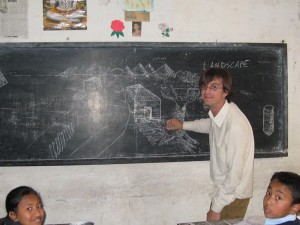 When I visited the Naxal School for the Deaf on my first day in Kathmandu, the students crowded around me asking questions. “What’s your name?” they asked. “Where are you from? Are you Deaf?” I touched my index finger to my ear and then my mouth, the sign for Deaf in both Nepali and American Sign Language. I was Deaf, too, and I knew immediately that I had found a community that was willing to accept me as one of its own. In fact, I was beginning to realize that I am part of a much larger community of more than one billion people with disabilities worldwide.
When I visited the Naxal School for the Deaf on my first day in Kathmandu, the students crowded around me asking questions. “What’s your name?” they asked. “Where are you from? Are you Deaf?” I touched my index finger to my ear and then my mouth, the sign for Deaf in both Nepali and American Sign Language. I was Deaf, too, and I knew immediately that I had found a community that was willing to accept me as one of its own. In fact, I was beginning to realize that I am part of a much larger community of more than one billion people with disabilities worldwide.
The focus of my Fulbright research in Nepal was creative—I was there to work on a collection of short stories. Just as importantly, though, I knew that I wanted volunteering to be a big part of my project. In my Fulbright application, I had mentioned that I planned to teach at the Naxal School in order to find inspiration and material for my stories.
Of course, that was only part of the reason I wanted to volunteer. As a former AmeriCorps volunteer who spent two years working on environmental projects in Portland, Oregon, I knew that volunteering would help empower both the community I was working with and myself. Also, it felt good to volunteer. Volunteering gave my Fulbright experience a deeper, more fulfilling meaning that I wouldn’t have had otherwise. It gave me the opportunity to make new friends and to give back to the community that was so generously hosting me for ten months.
I volunteered to teach art and American Sign Language at the Naxal School. Soon, I discovered that my students were used to learning drawing through copying and rote memorization, just like their hearing peers in most of Asia. My goal was to teach my students to think creatively, so I taught them art techniques like shading, perspective and drawing three-dimensional objects. Eventually, I showed them how to combine all of these techniques to make a landscape, and I was rewarded one afternoon when I came into the classroom and discovered that my students had drawn a landscape on the board for me.
After school, I taught students American Sign Language and learned more Nepali Sign Language in return. During lunch breaks, I sometimes played soccer and cricket with the students. Through my experiences, I made many close friends and I also got to know a Deaf Sherpa who eventually became my guide for a month spent in the Everest region of the Himalaya. Near the end of my time in Nepal, I helped arrange an overnight camping trip around the Kathmandu Valley with ten of the older students.
While volunteering is not a requirement for a Fulbright grant, I highly recommend it. Citizen diplomacy is an important part of the Fulbright experience, and in my mind, volunteering is citizen diplomacy at its best. Fulbright grantees, with or without disabilities, may find it particularly rewarding to volunteer within the disabled community of their host country. There are many opportunities to work with people who have disabilities, especially in developing countries. Disability-related organizations and people with disabilities are helping to lead a new worldwide human rights revolution that is working towards full inclusion and participation in all aspects of society for people who have disabilities. Volunteering has the potential to leave a high impact and allows Fulbright grantees to see disability in a new context.
In Nepal, being disabled has traditionally been considered a karmic curse and people with disabilities often weren’t allowed to marry. That is gradually changing, as more people with disabilities are being included in society and are working, marrying and speaking out for their rights. While I was in Nepal, I felt anything but cursed—instead, I felt blessed to be there on a Fulbright, and by volunteering, I wanted to spread some of that good karma around.
Photo: Franz Knupfer teaches students at the Naxal School for the Deaf in Kathmandu how to draw a three-dimensional landscape.
Franz Knupfer now works as the Project Coordinator of the National Clearinghouse on Disability and Exchange, a project administered by Mobility International USA and sponsored by the U.S. Department of State. Specific resources for people with disabilities interested in applying for a Fulbright grant can be found at: http://www.miusa.org/ncde/fulbright/.
